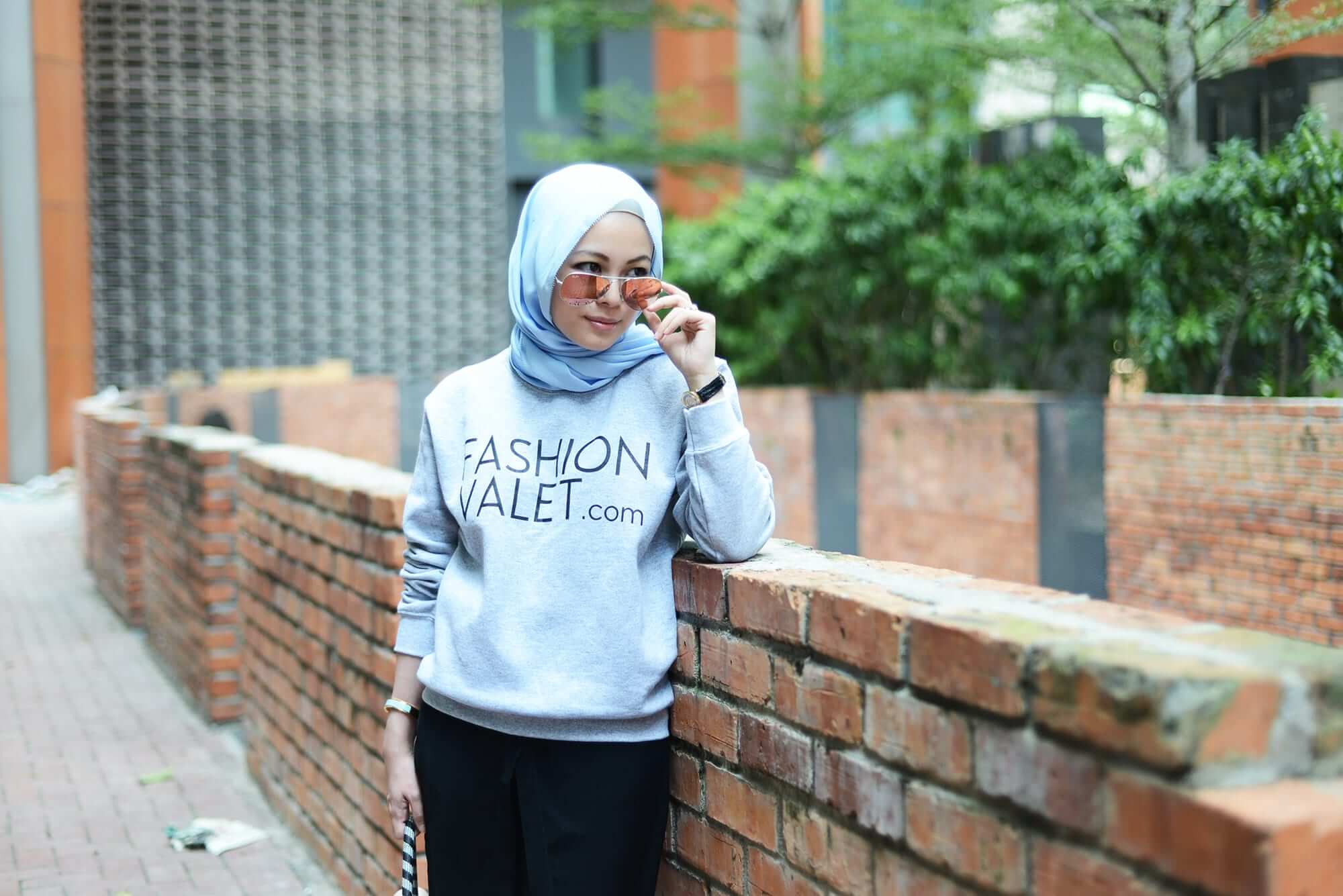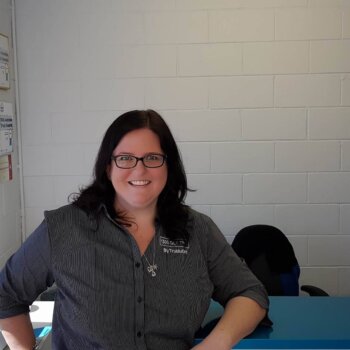I’m 28. I am happily married with 2 children; Daniel and Mariam. With my husband, I currently run FashionValet, one of Asia’s leading multi-label online sites carrying Asian designer labels, and The dUCk Group, a lifestyle brand of headscarves and stationery.
My education history is pretty interesting because I’ve had a taste of every different school; public school, boarding school, all-girls school, Islamic school, private school. I changed schools a lot because I used to get bored and had to fight my way with my parents to let me change schools. One agreement was if I could get no 1 in class, I could get out of boarding school, and I did! I also studied my A-Levels and SPM at the same time, flying back and forth between KL and the UK where my college was. It was crazy because my continuation at the college depended on my results (that was the deal if they allowed me to study both at the same time), but I managed to get all A’s in all my formal examinations in school; UPSR, PMR, SPM and A-Levels. I loved my colourful education life, and I often write about it to my young readers to inspire them to not take education and exams lightly.
I started blogging back in uni, where I read law at London School of Economics, UK (LSE). Writing has always been a passion of mine and I’ve been blogging for almost 9 years now at Proudduck.com about everything under the sun; love, life, career, family, and now motherhood. Upon graduating with a law degree, I decided the legal life wasn’t for me and I returned to Malaysia to work with my dad’s company the Proven Group which is in property development. The entrepreneurial spirit in me made me restless and pretty soon, I decided I wanted to have a business of my own. My husband (then boyfriend) and I came up with the idea of having an online store, after we saw that I had a big following online through my blog, of fashion-savvy females. Thus, FashionValet was born in Nov 2010. We were the first multi-label online site in Malaysia at the time and we only had 10 brands. We now have over 400 brands and offices in Malaysia and Jakarta, Indonesia. We are in the midst of setting up in Singapore now.
In your own words what is FashionValet?
One of the largest fashion sites in SEA, FashionValet is the pioneer multi-label online site stocking over 400 fashion designers and brands from South East Asia. We started our first flagship retail store in Bangsar Village, KL and are in the midst of setting up in Singapore and Brunei as next locations.
How did you come up with the idea of FashionValet?
Both of us studied in the UK where online consumerism was a part of daily life – you could even buy your groceries with the click of a button! We enjoyed the convenience of shopping online and it soon took over the way we conventionally shopped. After graduating university and returning to Malaysia, we realised that e-commerce was non-existent at home back in 2010. After being frustrated at the lack of online shopping options available to Malaysians (and Fadza being frustrated driving me around and being stuck in traffic jam and crowded parking lots), we decided to fill the gap ourselves! We talked to local designers and realised they were having challenges in reaching out to the masses and developing a solid customer base. We created FashionValet to push Malaysia towards expanding its consumer habits, but also to promote local designers and their immense talent.
Could you walk us through the process of starting up FashionValet?
We started off in 2010 with only RM100K of our own savings and borrowings. After two years on the relatively new e-commerce scene, we participated and won MYEG Make The Pitch Season 2, a nationwide TV programme, in 2012. We were able to expand FashionValet with our winnings and the exposure from the show widened our audience. This year, we secured Series A investment funding from Elixir Capital in Silicon Valley, California earlier this year and became one of the only companies in Malaysia to get funding from the tech city.
Fadza and I had no background in e-commerce or fashion in which I did law and he did Aeronautical Engineering. Therefore, we had to do everything from scratch with the limited amount of capital we had. Meeting local brands every day and convincing them of this new idea was easy because they were excited about the new online shopping phenomenon, and with my blog following, we connected the 2 parties (designers and customers) together. Our challenge was more on the tech side; everything was outsourced in the beginning from website design to payment gateway to managing bugs etc. We learned a great deal and the learning curve was very steep.
Did you encounter any particular difficulties during startup?
It’s hard to believe any startup not facing any challenges especially in their early days! We definitely had our fair share of highs and lows, from dealing with competitors to a small flood in our office. Starting your own company and creating a whole new “comfort zone” is terrifying, you’re constantly thinking “will this work?” “is there another way we should be doing this?”, but with the right determination, support and a little bit of luck, I believe we can take on any difficulties that come our way.
If I had to choose, I think our difficulty was the lack of capital. RM100K is what e-commerce stores spend on marketing per month! But for us, that was all we had to do everything. With RM 100K, a huge portion already went to office and warehouse renovation/rent, we had to purchase stock whereby a large chunk was consignment so that helped ease the load and the we put the rest into marketing which even that wasn’t a lot. We didn’t take salary for a few months until the company was stable.
We soon realized that we needed an injection of capital to grow faster. So we met with a lot of VCs and financial institutions. The conservative ones did not want to take the risk and did not understand the huge potential of e-commerce in South East Asia. So it wasn’t easy. In the end, we found the perfect match in one VC.
What kind of feedback did you get for FashionValet so far?
Because we carry a lot of Asian designer labels, the general perception of FashionValet is “expensive”. People see it as aspirational and our customers love to post ootd whenever they purchase from FashionValet and receive comments like “wow you bought from FV?”. It might turn people off when they think our products are expensive or premium, but I see this as a good thing because we immediately found our niche. To compete in this very competitive industry, one must find a niche and we seem to have found ours; we are targeting the more premium customers.
Another positive feedback is that FashionValet is “friendly”. The fact that I’m the face of FV and I am very active on social media, people sometimes leave comments with their order IDs for me to check on whatever issues they might have. I don’t get annoyed at this because to me, customers are my kings. I will check personally and reply them, so they know that FV is approachable and we will cater to whatever queries they might have. And we also do it in a friend-to-friend manner and not the corporate template of answers. This is something I don’t see with our competitors and I think this is one of the reasons people feel connected and loyal to FV.
Do you face a lot of competition in this industry?
Oh gosh definitely! Every industry will have competitors of course, but more so with ours because barrier to entry to start an online shopping website is non-existent. Anyone can do it! From stay-at-home moms to huge conglomerates, FV has stood its test of time and I take pride in this. We’ve been around for 5 years and growing our revenue more than double each year, despite the pains of competition. With competition, we were forced to innovate, to think, to re-strategize, to survive and I’d say my team is doing a pretty good job to stay on top. What we lack is capital which is easily attainable with investor funding. But what we are strong with is connections and relationships, customer service, and relevance in the fashion industry. And if I may, the best team with fresh ideas and commitment to work hard because they love what they do.
We’ve learned along the way and we’ve made some mistakes too. One mistake was to feel threatened by competition and thus try to do what they do, but better. Sometimes this is the wrong move because you forget your identity. One year, we signed on so many new brands because we were trying to win with our competitor because that was what they were doing. Any brand you see, sign them on. In the end, customers weren’t happy with FV because some brands were just not representative of FV and we weren’t happy because FV became somewhat “rojak” or “pasar” which for FashionValet, it means a broad mix of brands that are not cohesive. We had so many brands, but sales were dipping. In the end, we quickly realize this and went back to our roots to having a good curation of brands worthy to be stocked and promoted to our customers. We want brands which we ourselves would buy, wear, and be proud to wear. We went back to our identity, sales finally grew and our long-time customers came back.
Have you developed any industry insights that you could share?
We are fortunate to be a part of a very creative industry! Our Asian talents are just amazing and the industry is growing with these emerging talents that I’m so excited about. I meet regularly with designers to discuss their designs and ideas for collections, and I’m always in awe of what they’re able to come up with. There is remarkable talent in Southeast Asia and we are proud to highlight them on FashionValet. In this industry, you should be able to have hard power and soft power. Hard power in the sense that designers, collaborators and the consumers know that you have a solid “resume”, that you’re able to get the job done and you have successes to prove your worth. It is easy to go up to someone and tell them you can simply put photos of their clothes online to sell, when in fact there’s so much more that goes into it; buying, marketing, fulfilment, merchandising – it’s these ‘hard’ powers that sell products. You also require ‘soft’ power – the ability to talk and connect with others, make them feel comfortable working with you, gain their trust and prove that their loyalty to your company was worth their efforts. I feel these ‘softer’ powers are sometimes overlooked in our industry and more people should realize the capability of soft skills.
The e-commerce industry is also still growing. I don’t have the exact stats but we are not even close to the potential that Asia has in terms of online shopping. A lot of people are still learning to shop online or even getting attuned to online banking, so for us big players in the industry, natural growth is to our advantage. It’s a good industry to be in but you also have to use your guts and not get into hype. We’ve had our fair share of surprises for e.g. Indonesia is a market everyone talks about. The population itself is so attractive for any business but in actual fact, the culture there is so different than Malaysia in terms of shopping habits. I’ve learned that each country has a different way of shopping and you really cannot replicate successes from different countries and think you’ll do well in others. Localization is very important.
What is the future of the industry?
E-commerce is constantly expanding, the potential is enormous and I think smart investors know that, that’s why I found out that FashionValet is worth so much more than I thought during our investment rounds. It opened my eyes to realize that I can take FV to greater heights and we’re not even close yet to reaching our full potential, so it’s not time to sit happy and relax. It’s time to work, work and work.
We will remain relevant as long as customers still shop online and fashion designers still trust us to do a good job representing them. So we will do just that. I also realize the importance of technology; after all, we’re a tech company first. So we have hired a big engineering team in our company to constantly improve shopping experience on the website, building our own system linking warehouse and operations together, building apps, linking online and offline channels together, so many wonderful things can happen with a lively tech team! Makes me wish I studied it!
To keep things exciting, we will always collaborate with fashion designers, partner with relevant third parties, host events and introduce campaigns to our customers. Just last month, we had an FV Instagram takeover campaign (in partnership with Malaysia Airlines) by celebrities going on holiday and wearing outfits from FashionValet, and we opened this afterwards to our customers in form of a contest. It was widely received and we got everyone excited including ourselves.
Were there anything that disappointed you initially?
That I did not know how to code. I never realized how important it is and how much that skill is needed for a company like FashionValet. When website is down temporarily or bugs unfortunately happen or we need to do a simple reset of something, I feel so hopeless because I had to depend on third party companies to fix our problems and these companies are often in different time zones than us. After all these frustrations, we finally invested in our own in-house tech team and I am so happy with how the team works now. I’m going to force my children to do 2 things; learn coding and learn Mandarin.
What do you think about being an entrepreneur in Asia?
There are many opportunities for entrepreneurs in Asia – the region is rich in resources, technology and talent. It is also developing, so potential is crazy huge. The connectivity of our business makes things easy and gives us many options! Just last month we hopped on a plane to China, went to a factory, chose material, watched a sample design being made in front of us and were able to place an order right away! This probably wouldn’t have happened as easily if we lived on a different continent. However because of how large and vast the Asian market is, we are constantly faced with new competitors who are eager to win over consumers and water down the industry with products that are of lesser quality. Foreign companies are all looking to the East to set up shop, and this might be good as foreign investment but when they monopolize with their deep pockets, it also kills opportunities for Asian entrepreneurs already here.
What is your opinion on Asian entrepreneurship vs Western entrepreneurship?
Asian entrepreneurs I feel are still very big on culture and respect. But the cons of that are also that we are not as straight up as how I’d like it to be. When it’s a “no”, what you will hear instead is “that sounds really interesting” and not hear back anymore. We are still cautious of people’s feelings which are good but for me personally, I’d rather be honest. A lot of the times, I give honest feedback which people might not like to hear, because I feel like I’m helping them more by speaking the truth.
Asian entrepreneurs are also generally more conservative in terms of investments. When we speak to VCs from Malaysia or neighboring countries, it’s not as easy to convince them on the potential of e-commerce. But this is the exact opposite of Western VCs. They really believe in the future of e-commerce and tech as something huge and they want to get in it as early as possible.
Other than that, I don’t deal a lot with Western entrepreneurs nor do I know much about their work culture, but from what I hear, Asian entrepreneurs work faster and feel a bigger need to prove ourselves.
What is your definition of success?
I don’t define success because I don’t feel the need to. Once you define it and you achieve it, then what happens? Complacency or self-pride happens, which is bad. I just do my thing and set new goals every time I’ve hit one, and not think too much about it.
Why did you decide to become an entrepreneur?
It was when I was a child and accompanying my dad in his office during my school holidays. It’s not so much about the money, but it’s so exciting seeing him handle different departments and tackling problems and moving around all day. I get bored and restless very easily, so entrepreneurship is really for me because there’s never a dull moment. Everything depends on you; from decisions you make to the mood you give off to your team in the morning, you are responsible for steering the ship. My husband and I both grew up in entrepreneurial families, so it’s all we know!
In your opinion, what are the keys to entrepreneurial success?
For me, it’s the need to always want to win and be no. 1. Once you have this drive, you’ll want to see your business do well and you don’t need any other motivation but yourself. Passion for something is very important, you will only really excel at something you love doing. Find that something you’re passionate about.
Any parting words of wisdom for entrepreneurs out there from your personal experience?
I repeat this a lot, but it’s very important to not look for praises but instead you look for your weaknesses to overcome them. Ask people what they hate about your business, that’s the only way to strengthen your model. And don’t ask your family or best friends because they will love you no matter what and you are always a hero to them. I love critics because they help me improve my business; I love competitors because they challenge my work. My dad never taught me to be comfortable in what I do. Even when I got 90% in an exam, he would ask me why not 100%? I used to get so annoyed with him, but now I think that is the best training I receive to always want to win and excel in my work.
Connect
Blog: http://www.proudduck.com/
Instagram: @vivyyusof 370K
Facebook: Vivy Yusof
FashionValet: http://www.fashionvalet.com/
Instagram: @fashionvaletcom 240K
Facebook: FashionValet
dUCk: http://duckscarves.com/
Instagram: @theduckgroup 112K
Facebook: dUCk scarves





























